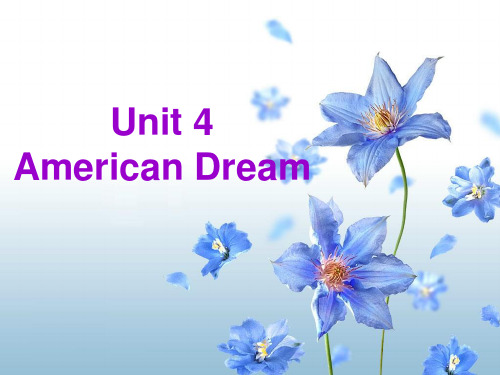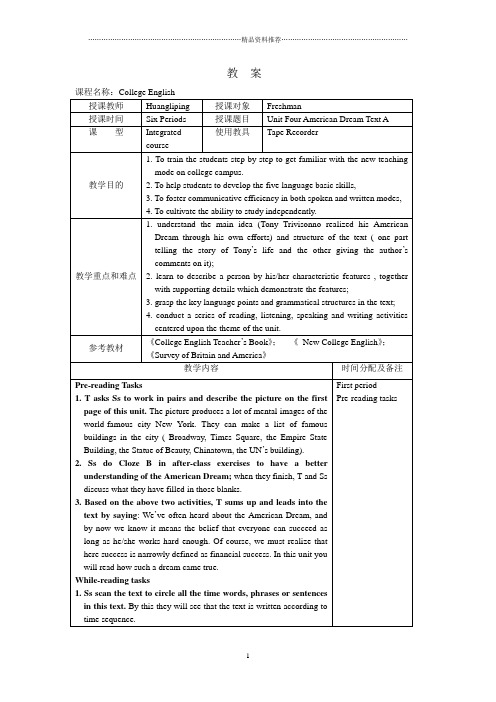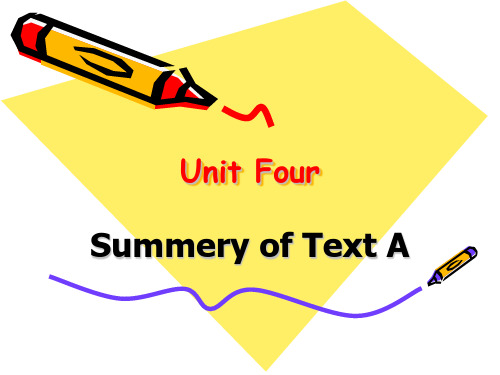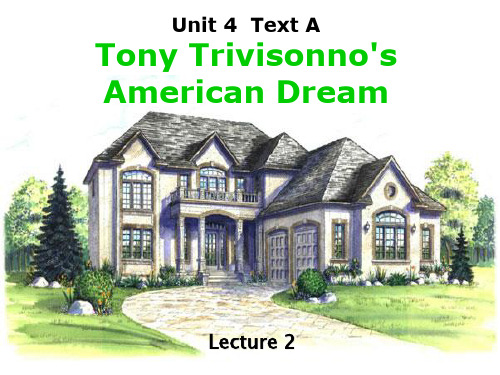大学英语综合教程第一册 unit 4 American dream Text A Tony Trivisonno's American dream
- 格式:ppt
- 大小:1.98 MB
- 文档页数:28




论党对马克思主义中国化时代化大众化的历史探索孙忠良;陈德祥【期刊名称】《山东青年政治学院学报》【年(卷),期】2011(000)004【摘要】党的十七届四中全会提出要大力推进马克思主义中国化、时代化、大众化的重大战略任务。
这项任务的提出具有十分重要的现实意义和长远的历史意义。
在中国共产党90年的发展历程中,一直致力于推动马克思主义的中国化、时代化、大众化,但是党对于这一问题的认识却经历了一个曲折的历史过程。
综观党对马克思主义中国化、时代化、大众化的历史探索,将有利于总结历史经验,进一步推动马克思主义理论创新。
%The forth CCP Congress point out it is a must to advocate the chinization,up-dating and popularity o f Marxism,which is burdened with great significance in terms of reality and history.In the process of the development of CCP,despite of the tendency,it is intricate to realize thoroughly this subject.In an eagle's view,the explore of chinization,up-dating and popularity of Marxism benefits how to summarize a certain period of history and further theory innovation.【总页数】4页(P1-4)【作者】孙忠良;陈德祥【作者单位】吉首大学,湖南吉首416000;吉首大学,湖南吉首416000【正文语种】中文【中图分类】B27【相关文献】1.中国共产党对马克思主义中国化时代化大众化关系的认识发展 [J], 陈德祥2.马克思主义中国化时代化大众化的历史探索 [J], 孙忠良;陈德祥3.建国后毛泽东对于马克思主义中国化时代化大众化的历史探索 [J], 孙忠良;董钰涵;4.论党对马克思主义中国化时代化大众化的历史探索 [J], 孙忠良;陈德祥5.党对推进马克思主义中国化时代化大众化规律的有益探索 [J], 杨子萍;因版权原因,仅展示原文概要,查看原文内容请购买。


The Translation Exercises of for the Final Exam New College English BookⅠ(Unit 1~ Unit 4)By Alfred Willing Ⅰ. Sentences Translation.(Unit 1 Growing Up)1.那是个正规宴会,我照妈妈对我讲的那样穿着礼服去了。
2.他的女友劝他趁抽烟的坏习惯未根深蒂固之前把它改掉。
3.他们预料到下几个月电的需求量很大,决定增加生产。
4.据说比尔因一再违反公司的安全规章而被解雇。
5.据报道地方政府已采取适当措施避免严重缺水的可能性(Unit 2 Friendship)6.半个小时过去了,但末班车还没来。
我们只好走回家。
7.玛丽看上去对汉语考试很担心,因为她还没有背熟课文。
8.既然篮球赛已被推迟,我们不妨去参观博物馆。
9.整个二次世界大战期间他一直和父母住在澳大利亚。
10.自1985年从南京大学毕业至今,可以说我与我的大学同学失去了联系。
(Unit 3 Understanding Science)11.正如科学家所预言的那样,全球污染成了人类面临的最严重的问题之一。
12.谋求这些职位竞争很激烈——今年的求职者是去年的五倍。
13.正如事实表明的那样,教育大纲应当符合国家的经济发展计划。
14.这辆汽车太费油,而且价钱几乎是我想付的两倍。
15.要了解一起重大的国际事件,我们首先需要考虑其历史与政治背景。
(Unit 4 The American Dream)16.据报道,联合国斡旋者指定出了他们希望双方都能接受的方案。
17.多丽丝小心翼翼地在森林里行走,害怕遭到大蛇攻击。
18.地震、台风和其他自然灾害无法防止,但可采取行动保护生命财产。
19.我买了一期新的我最喜欢的体育杂志就赶紧回家,急着想度之自娱。
20.海伦缺乏信心。
我从未遇到过像她那样没有自信的人。
Ⅱ. Passages Translation.(Unit 1 Growing Up)苏珊因车祸失去了双腿,有一段时间,她真不知道如何面对自己再也不能行走的事实。
Unit 4Exercises Leisure TimeDetailed Understanding General Understanding Lead in ActivitiesLead in ActivitiesLook at the following pictures and tell what and where they are.Unit 4 American DreamHollywood in CaliforniaDisneyland Park in California The White House In Washington D.CStatue of Libertyin New YorkWhat do you often associate America with?opportunitiesmoneyviolence terrorismgood jobbettereducationbetter lifeAme caBrainstormingWhy do they go to America ?Do you want to go to America? Why?From this we can see that people go to America with different goals and aims. All the goals are just like their dreams. They want to seek their own dreams in America-American Dream.Today we are going to learn a text about American dream of an ordinaryperson. Let’s see what his Americandream is and how he realizes it.backGeneral UnderstandingLet’s go through the text quickly and answer the following questions together.1. Where did Tony come from?(Para1)He came from a rocky farm in Italy, somewhere of south of Rome.He was an immigrant.He immigrated into America.He emigrated from Italy.2. What did he look?(Para1)He was about five-foot-seven or eight, and thin.1英尺=12英寸=0.3048米1英寸=2.54 厘米 1.73m 3. Where did they meet?(Para1)Standing in the driveway, behind my garage.4. What did Tony ask from the writer?(Para2-4) He asked to mow the loan for the writer. (for a job)5. Can I understand him? Why?(Para2-4)No. Because of his broken English-结结巴巴的英语6. How many times did he say “I mow your loan.” ?(Para2-4)The sentence is repeated four times. That’s because it shows Tony’s determination in finding a job, and his optimistic view that people would help a man who needed a job.He is strong-minded & determined& optimistic.7. Did I want to hire him? Why?(Para2-4)These Depression days were difficult and I can’t afford a gardener.8.What happened next day?(Para5-7)My lawn had been mowed by Tony.9. Did Tony get the mowing job?(Para8-10)Yes. I managed to work out some kind of small weekly pay.10. How did Tony treat this job?(Para8-10)clean up the yard, take care of any little tasks, liftheavy objects, fix things.He was active and serious-minded.11. When summer passed into fall, what job did Tony ask to do? Did he get it?(Para11-13)He asked to clear snow at the factory.12. What was evaluation for Tony from personnel department?(Para11-13)Tony was a very good worker.13. …, snow pretty soon. When winter come, you give me job clearing snow at the factory.(Para11-13) It’s going to snow pretty soon.When winter comes, you give me the job of clearingsnow at the factory.14. Later, what did Tony asked to be? How? (Para14-16)He asked to be an apprentice. He took a cut in pay.15. What was consequence/result? How did we feel about it?(Para14-16)He had graduated as a skilled grinder.My wife and I were delighted.He was really confident.16. A year or two later, what did Tony want to do? How did I help him?(Para17-21)He wanted to buy a house. and I helped him to loan money from a bank.17. “I like a buy a house.”(Para17-21)“I like to buy a house.”He was far-sighted and had a vision.18. After about two years, what did Tony tell me? (Para22-26)He had sold his house and bought a farm.19. “I sell my house.” “I buy a farm.”(Para22-26)I’ve sold my house. I’ve bought a house.20. What was Tony’s dream?(Para22-26)To own a farm.21. What did he look then?(Para22-26)He seemed to stand a little straighter. He was heavier. He had a look of confidence.We sat down and talked.22. On a Sunday afternoon, when Tony arrived to meet me, what did he look?(Para27)He was neatly dressed.24. In Tony’s childhood friend’s eyes, Tony was a __________.(Para27)26. Did Tony do a good job of running his farm?Examples.(Para28-29)farm, house, tractor, a car, children, no debtmillionaire25. During the war, Tony ___________.(Para28-29)passed away27. How did I look at him after he passed away? (Para30-33)He grew in stature in my mind. He stood as tall, as proud, as the greatest American industrialists.28. What are the similarities between the greatest American industrialists and Tony?(Para30-33) have their own dream;the same route-working hard;the same values and principles;the same balance sheet29. What are the differences?(Para30-33)Industrialists Tony basis affairbalance sheet 30. What is the key to Tony’s success?(Para30-33)Hard-working, determination, vision, being honest, being responsiblebegin on the bottom rung of the ladder begin in the basement giant tiny great financial achievements small financial achievementsStructurePart 1Para 1-29With determination, and with help from Mr. Crawford, Tony achieved his dream of owning his own farm.Part 2Para 30-33The author’s reflections on Tony’s success.Time SequenceFind out time words and phrases to follow each step of Tony on his way to success.lines Time words andphrasesTony’s Steps toward Success1-26 27-33 34-43Tony started to work as a help atMr. Crawford’s house.Tony got a job clearing snow at Mr.Crawford’s factory.Tony asked to be trained as anapprentice, and later learned to be askilled worker.one eveningsummer passedinto fallone daylines Time words andphrases Tony’s Steps toward Success44-58 49-76 77-82Tony bought a house with the help ofMr. Crawford.Tony bought a farm and sent for hisfamily in Italy.Tony died, leaving his family aprosperous farm and his childreneducated.a year or two passedafter about two yearsduring the warbackLanguage Points Sentence Structure TranslationDetailed UnderstandingTony Trivisonno’s American DreamFrederick C. Crawford He came from a rocky farm in Italy, somewhere south of Rome. How or when he got to America, I don’t know. But one evening I found him standing in the driveway, behind my garage. He was about five-foot-seven or eight, and thin.“I mow your lawn,” he said. It was hard to comprehend his broken English.I asked him his name. “T ony Trivisonno,” he replied. “I mow your lawn.” I told T ony that I couldn’t afford a gardener.“I mow your lawn,” he said again, then walked away.I went into my house unhappy. Yes, these Depression days were difficult, but how could I turn away a person who had come to me for help?When I got home from work the next evening, the lawn had been mowed, the garden weeded, and the walks swept. I asked my wife what had happened.“A man got the lawn mower out ofthe garage and worked on the yard,”she answered. “I assumed you had hiredhim.”I told her of my experience thenight before. We thought it strange thathe had not asked for pay.The next two days were busy, and I forgot about T ony. We were trying to rebuild our business and bring someof our workers back to the plants. But on Friday, returning home a little early, I saw T ony again, behind the garage. I complimented him on the work he had done.“I mow your lawn,” he said.I managed to work out some kind of small weekly pay, and each day T ony cleaned up the yard and took care of any little tasks. My wife said he was very helpful whenever there were any heavy objects to lift or things to fix.Summer passed into fall, and winds blew cold. “Mr. Craw, snow pretty soon,” T ony told me one evening. “When winter come, you give me job clearing snow at the factory.”Well, what do you do with such determination and hope? Of course, T ony got his job at the factory.The months passed. I asked the personnel departmentfor a report. They said T ony was avery good worker.One day I found T ony at ourmeeting place behind the garage. “Iwant to be ’prentice,” he said.We had a pretty good apprenticeschool that trained laborers. But Idoubted whether T ony had thecapacity to read blueprints andmicrometers or do precision work. Still,how could I turn him down?T ony took a cut in pay to become an apprentice. Months later,I got a report that he had graduated as a skilled grinder.He had learned to read the millionths of an inch on the micrometer and to shape the grinding wheel with an instrument set with a diamond.My wife and I were delighted with what we felt was a satisfying end of the story.A year or two passed, and again I found T ony in his usual waiting place. We talked about his work, and I asked him what he wanted.“Mr. Craw,” he said, “I like a buy a house.” On the edge of town, he had found a house for sale, a complete wreck.I called on a banker friend. “Do you ever loan money on character?” I asked. “No,” he said. “We can’t afford to. No sale.”“Now, wait a minute,” I replied. “Here is a hard-working man, a man of character, I can promise you that. He’s got a good job. You’re not getting a damn thing from your lot. It will stay there for years. At least he will pay your interest.”Reluctantly, the banker wrote a mortgage for$2,000 and gave T ony the house with no down payment. T ony was delighted. From then on, it was interesting to see that any discarded odds and ends around ourplace —a broken screen, a bit of hardware, boards from packing —T ony would gather and take home.After about two years, I found T ony in our familiar meeting spot. He seemed to stand a little straighter. Hewas heavier. He had a look of confidence.“Mr. Craw, I sell my house!” he saidwith pride. “I got $8,000.”I was amazed. “But, T ony, where areyou going to live without a house?”“Mr. Craw, I buy a farm.”We sat down and talked. T ony told me that to own a farm was his dream. He loved the tomatoes and peppers and all the other vegetables important to his Italian diet. He had sent for his wife and son and daughter back in Italy. He had hunted around the edge of town until he found a small, abandoned piece of property with a house and shed. Now he was moving his family to his farm.Sometime later, T ony arrived on a Sunday afternoon, neatly dressed. He had another Italian man with him. He told me that he had persuaded his childhood friend to move to America. T ony was sponsoring him. With an amused look in his eye, he told me that when they approached the little farm he now operated, his friend stood in amazement and said, “T ony, you are a millionaire!”Then, during the war, a message came from my company. T ony had passed away.I asked our people to check on his family and see that everything was properly handled. They found the farm green with vegetables, the little house livable and homey. There was a tractor and a good car in the yard. The children were educated and working, and T ony didn’t owe a cent.After he passed away, I thought more and more about T ony’s career. He grew in stature in my mind. In the end, I think he stood as tall, and as proud, as the greatest American industrialists.They had all reached their success by the same route and by the same values and principles: vision, determination, self-control, optimism, self-respect and, above all, integrity.T ony did not begin on the bottom rung of the ladder. He began in the basement. T ony’s affairs were tiny; the greatest industrialists’ affairs were giant. But, after all, the balance sheets were exactly the same. The only difference was where you put the decimal point.T ony Trivisonno came to America seeking the American Dream. But he didn’t find it —he created it for himself. All he had were 24 precious hours a day, and he wasted none of them.Summary WritingFrom the start, Tony showed his ________ to ______his dream. When he came to Mr. Crawford for help, for the first time, Mr. Crawford __________, but he didn’t give up. Later, Mr. Crawford offered him a job in thefactory. He worked hard, and learned to be a ________worker. Then with Mr. Crawford’s help, he managed toget a loan on _________ for a house. Finally he boughta farm, and he was able to _________ his family fromItaly.His dream came true.①determination; ②realize/achieve/fulfill;③turn him away/down;④skilled/skillful;⑤character; ⑥send for①②③④⑤⑥After Tony graduating from college, Tony decided to ____________________(自己创业). At the beginning,many banks ___________________(拒绝了他的贷款要求). Buthe was not discouraged and continued to_________________(拜访一个个的银行家) seeking help. Moved by his __________________________(决心和乐观精神), a banker agreed to loan him. Now he has become a wealthy businessman. ____________________ (在谈到惊人的成就时), Tony put emphasis on ____________________(创造机遇而不是等待机遇的重要性。